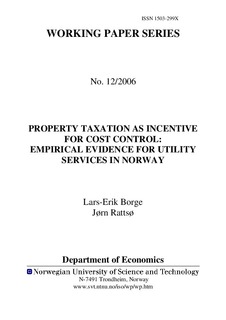| dc.contributor.author | Borge, Lars-Erik | nb_NO |
| dc.contributor.author | Rattsø, Jørn | nb_NO |
| dc.date.accessioned | 2014-12-19T14:31:40Z | |
| dc.date.available | 2014-12-19T14:31:40Z | |
| dc.date.created | 2006-09-29 | nb_NO |
| dc.date.issued | 2006 | nb_NO |
| dc.identifier | 126034 | nb_NO |
| dc.identifier.uri | http://hdl.handle.net/11250/267055 | |
| dc.description.abstract | Recent theoretical research suggests that property taxation has incentive effects that can help control cost problems in the public sector. The institutional setting in Norway allows this first empirical investigation of the incentive effect of property taxation, since we can separate between local governments with and without property tax. The raw data of the variation in the unit cost level for utilities show that local governments with property tax have about 20% lower unit cost. Using both linear regression and propensity score matching, we are not able to wash out the difference in unit costs. Our interpretation is that having a visible and controversial local tax related to property stimulates voter interest in local government activities and thereby may help cost control. The incentive effect is of interest for the design of fiscal federalism. | nb_NO |
| dc.language | eng | nb_NO |
| dc.publisher | Institutt for samfunnsøkonomi | nb_NO |
| dc.relation.ispartofseries | Working Paper Series, 1503-299X; 2006:12 | nb_NO |
| dc.title | Property taxation as incentive for cost control: Empirical evidence for utility services in Norway. | nb_NO |
| dc.type | Research report | nb_NO |
| dc.contributor.department | Norges teknisk-naturvitenskapelige universitet, Fakultet for samfunnsvitenskap og teknologiledelse, Institutt for samfunnsøkonomi | nb_NO |
